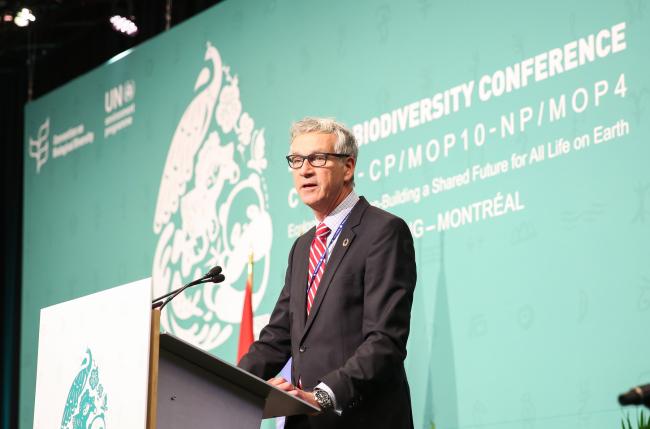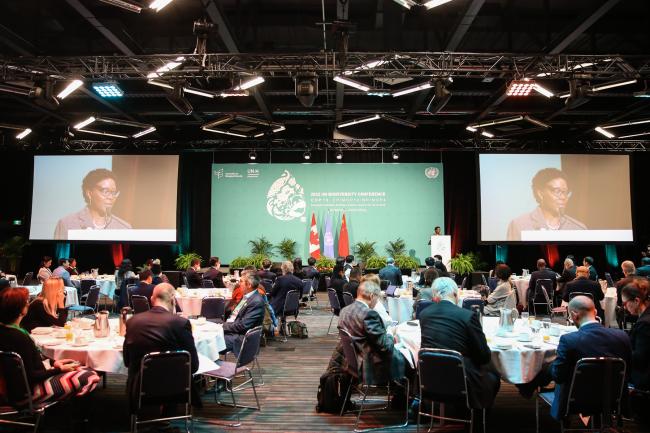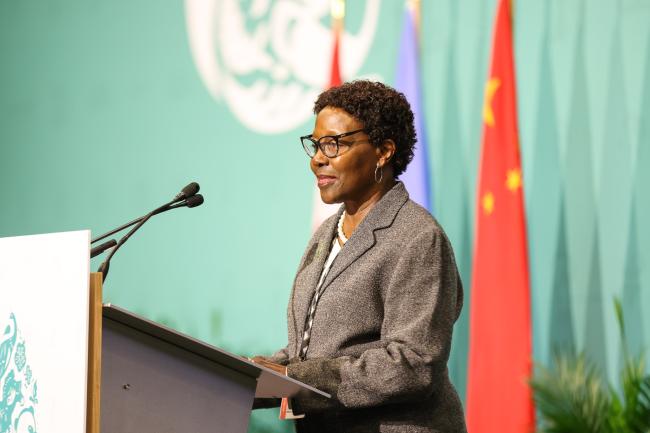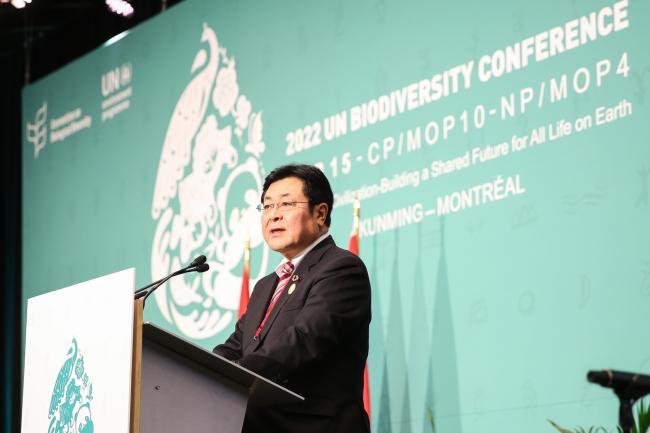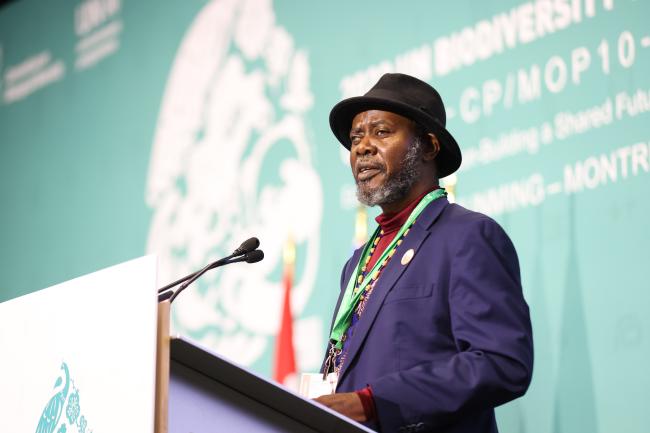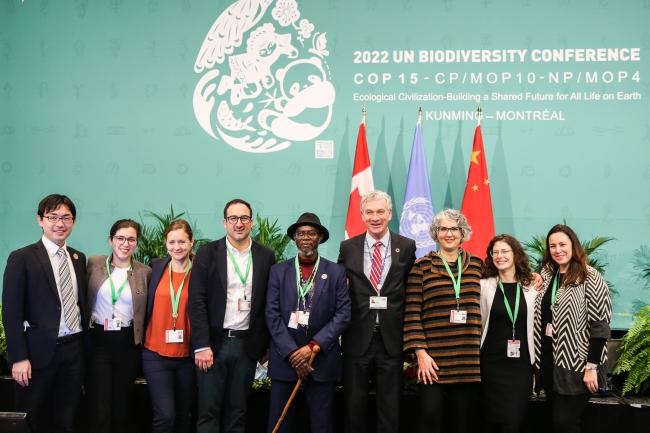About
This high-level breakfast discussed actions in implementing and operationalizing the Nagoya Protocol on Access and Benefit Sharing in a mainstreamed, effective, and practical manner—and how to ensure full ratification of the Protocol by all CBD Parties.
This high-level breakfast, moderated by Timothy Hodges, former Co-Chair of the Working Group on Access and Benefit Sharing of Genetic Resources (ABS) of the Convention on Biological Diversity (CBD), provided an opportunity to discuss actions in implementing and operationalizing the Nagoya Protocol on ABS in a mainstreamed, effective and practical manner, and to ensure full ratification of the Protocol by all CBD Parties.
Hodges noted that it takes courage and wisdom to reach decisions on policies that will determine the fate of mankind, opining that the Nagoya Protocol was the first global legally binding instrument on the implementation of sustainable development. He lauded the leadership of Japan, noting the role played by the country in the adoption of the Protocol at the tenth meeting of the Conference of the Parties of the CBD (CBD COP 10).
Elizabeth Maruma Mrema, Executive Secretary, CBD, lauded the 12 years of implementation of the Nagoya Protocol, recalling that its adoption was the culmination of a long road to addressing the third goal of the CBD: the fair and equitable sharing of the benefits arising out of the utilization of genetic resources. She noted that implementation of the Protocol is being perfected as more countries implement it, outlining that: it now has 138 Parties (as of December 2022); 132 Parties have national ABS measures; and over 4320 permits have been issued. Acknowledging implementation challenges, she underlined the need to turn these into opportunities to adapt. She applauded Japan for its leadership in the process, highlighting the Japan Biodiversity Fund which has provided USD 60 million in funding since 2010. She welcomed the support of the Chinese COP Presidency, underlining that agreement on the post-2020 global biodiversity framework (GBF) will further support implementation of the Protocol.
Passing the Nagoya Protocol implementation baton to China, Akihiro Nishimura, Minister of Environment, Japan, praised Parties for their implementation of the Nagoya Protocol over the last 12 years since it was adopted at COP 10 in Japan, and shared the country’s passing of national measures on ABS. He drew attention to NPIF, which was established to facilitate the early entry into force and implementation of the Protocol. He called on countries to strengthen their efforts in implementing the Protocol, highlighting the contributions of users and providers to this end.
Huang Runqiu, Minister of Environment, China, said that China became a party to the Protocol in 2016, and has since passed various legislative measures to implement the Protocol. With the support of UNDP, he highlighted the implementation of projects, sharing that the country had established the Germplasm Bank of Wild Species as part of its ABS considerations. He called on all negotiators to show flexibility in their negotiations on the fair and equitable sharing of the benefits of digital sequence information (DSI), resource mobilization, and the GBF.
Taukondjo Shikongo, CBD Secretariat, presented on the status of the implementation of the Nagoya Protocol, priority areas for future work, and opportunities for the Protocol in the context of the GBF. He described the “ABC” of the Protocol, describing these as access, benefit-sharing and compliance. He noted challenges in benefit-sharing, including that it may take years for benefits to materialize from research and development processes, and noted an absence of a global baseline for benefits generated from ABS. He reaffirmed the CBD’s commitment to support parties in the implementation of the Nagoya Protocol.
In the ensuing discussion, participants highlighted: that there is more work to be done in the implementation of safeguards against biopiracy and in protections for Indigenous Peoples as the holders of traditional knowledge; the need for robust governance measures regarding access to genetic resources; the importance of capacity building across sectors; the need for mutual supportiveness in implementing the Protocol and the International Treaty on Plant Genetic Resources for Food and Agriculture (ITPGRFA); and national measures to implement the Protocol, including through understanding the needs of stakeholders and developing a common understanding of the issues related to the Protocol. Participants also: underlined the importance of increasing public awareness; shared that the implementation of the Protocol requires inter-ministerial cooperation and coordination across sectors; called for a whole-of-government implementation approach; and stressed the need to share best practices.
In closing, Amina J. Mohammed, Deputy Secretary-General, via video, lamented that human actions have accelerated the crisis of biodiversity loss, but noted that the Protocol is one of the tools to reverse this trend. She stated that lasting benefits will require the full implementation of the Protocol, including through the GBF, and called on delegations to strengthen their resolve to ensure the Nagoya Protocol continues to contribute to the achievement of sustainable development for all.
Organizers: CBD
Contact: Gisela Talamas gisela.talamas@un.org
For more information: https://www.cbd.int/abs/
Written and edited by Tallash Kantai, Vijay Kolinjivadi, PhD, and Deborah Davenport, PhD.
All ENB photos are free to use with attribution. For this event, please use: Photo by IISD/ENB | Natalia Mroz
To receive free coverage of global environmental events delivered to your inbox, subscribe to the ENB Update newsletter.


